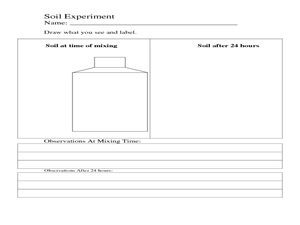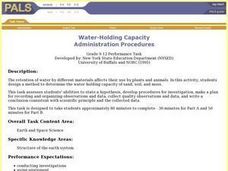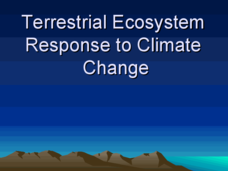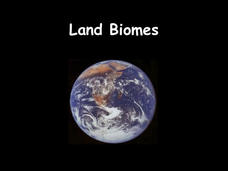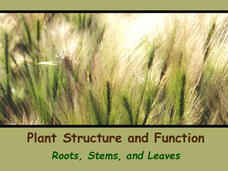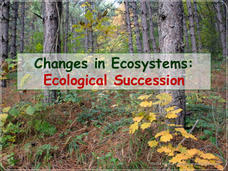Curated OER
Understanding How Potatoes Grow
Second graders make a KWL chart and brainstorm what they need for the project of growing potatoes. They choose one potato and plant it in water or peat moss cups and choose a location in which meets the needs of the plants and make their...
Curated OER
Under Our Feet
Students investigate the forest ecosystem to learn of the living and non-living elements of the soil. In this ecosystem lesson, students examine soil for twigs, moss, fungi, leaves, roots and other matter. Students complete a...
Curated OER
First Nations Plants and their Uses
Students identify the uses of plants by researching Native Americans. In this First Nations culture lesson, students identify the First Nations coastal people of British Columbia and their use of plants such as seaweed, bark and moss....
Curated OER
Text Elements of Fiction and Nonfiction
Second graders examine the text elements associated with fiction and nonfiction texts. In this text elements instructional activity, 2nd graders listen to Anansi and the Moss Covered Rock by Eric A. Kimmel. They take formative...
Curated OER
Tundra Word Search
In this earth science worksheet, students identify and locate various vocabulary terms pertaining to the tundra. There are 21 earth science terms located in the word search.
Curated OER
Water-Holding Capacity
Students design and conduct an experiment to compare the water-holding capacity of sand, soil, and moss. They measure the change in weight for each material after adding the same amount of water to each material.
Curated OER
Why Mosquitoes Buzz in People's Ears
Pupils find themes in folktales. In this folktale lesson, students read different folktales from Africa to find what message the author wants the reader to learn. They read "Why Mosquitoes Buzz in People's Ears" by Verna Aardema,...
Curated OER
Characteristics of Plants
In this characteristics of plants activity, students name two things that all plants have in common. Then they describe how the cell walls and cuticles help plants adapt to life on land. Students also explain the difference between...
Curated OER
Seedless Plants
In this plant worksheet, students complete 1 short answer question and 6 fill in the blank statements using a word bank about seedless plants.
Curated OER
Missing Letters
In this writing worksheet, students trace the missing letters from four words. They rewrite the word independently on the line. Words include: sea, moss, fish, and mud.
Curated OER
Ramadan
Students research Ramadan and festivals from other faiths using the religious festivals guide. They use information from the guide and Fatemeh's Press Pack to write a letter to the Football Association explaining why Abraham Moss...
Curated OER
The Effects of Color on Heat Absorption And Climate
Students conduct an experiment to determine the effects of soil color on its day and night time temperatures. In small groups, they prepare dishes of black soil, brown peat moss, and white sand. They record the temperature changes when a...
Forest Foundation
The Web of Life
Producers, herbivores, carnivores, omnivores, decomposers. To begin a study of the forest ecosystem, learners examine the connections among the members of ecological communities.
Curated OER
The Hydrologic (Water) Cycle
Learners construct a model of the hydrologic cycle, and observe that water is an element of a cycle in the natural environment. They explain how the hydrologic cycle works and why it is important, and compare the hydrologic cycle to...
Curated OER
Pharaoh Mountain Hike: Investigating Adirondack Life Zones
Students hike a local mountain and examine its life zones. They measure various components at each zone and collect leaf litter at the sites. At the mountain top, students make descriptive observations and complete a handout about the...
Curated OER
Comparison of Protein Sequences From Two Samples of Crabmeat Using Gel Electrophoresis As an Introduction To the Biotechnology Lab
Students discover that proteins that are the product of DNA translation are different for different species. They determine that by analyzing their mass and charge they can differentiate between two different species. They use some of...
Curated OER
Plant Parts and their Function
Discover why plants are important to our world. View plant parts and categorize them as stems or buds. Students do a cut and paste of pictures of plants into correct categories. Students also plant a carrot top,and record the growth and...
Curated OER
Biomes
Arranged as an interactive lesson, this presentation focuses on the six world biomes. Upcoming biologists click on a specific biome and a slide lists its location, description, native plants, and animals. A quiz provides learners with...
Curated OER
Terrestrial Ecosystem Response to Climate Change
An extensive investigation of the Earth's climate changes awaits your environmental science classes. This top-notch presentation begins by looking at the history of Earth's climate and then predicts the impact on each major terrestrial...
Biology Junction
Plant Diversity
Ginkgo trees existed for more than 350 million years, and, at this time, only one species still remains. While plant diversity generally increases over geologic time, some interesting exceptions occur. Young scientists learn about plant...
Biology Junction
Land Biomes
Biomes share similar climates and ecosystems, despite being separated geographically on the planet. A presentation introduces the six most common land biomes. It focuses on the commonalities in climate, plants, and animals with many...
Biology Junction
Plant Structure and Function: Roots, Stems, and Leaves
Scientists found fossils of plants more than 420 million years old—but plants existed for up to 100 million years prior to these fossils. Learn about the importance of plants to the entire planet. Viewing a presentation helps scholars...
Biology Junction
Changes in Ecosystems: Ecological Succession
Can an area with no soil turn into a forest? Scholars learn about the process of ecological succession using an interesting presentation. It covers both primary and secondary succession in the building of new ecosystems.
Other popular searches
- Ferns and Mosses
- Lichens and Mosses
- Plants Mosses and Ferns
- Ferns and Mosses Spores
- Ferns Mosses
- Life Cycle of Mosses
- Club Mosses
- Clun Mosses
- Clung Mosses
- Grandma Mosses
- Seeds Cones Ferns Mosses
- Seeds, Cones, Ferns Mosses



